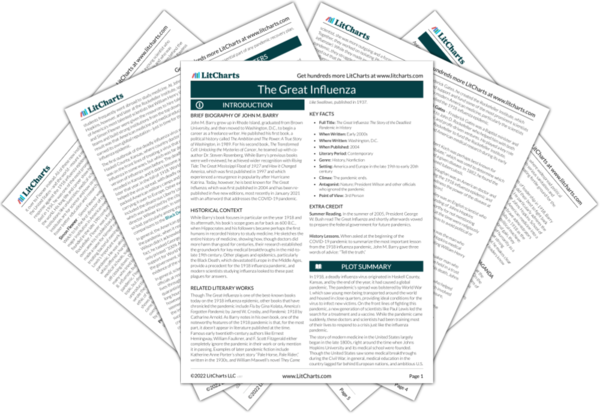Simon Flexner Quotes in The Great Influenza
The Rockefeller Institute Hospital opened in 1910. By then the best of American medical science and education could compete with the best in the world. But an enormous gap existed in the United States between the best medical practice and the average, and an unbridgeable chasm separated the best from the worst.
As the virus moved, two parallel struggles emerged.
One encompassed all the nation. Within each city, within each factory, within each family, into each store, onto each farm, along the length of the track of the railroads, along the rivers and roads, deep into the bowels of mines and high along the ridges of the mountains, the virus would find its way. In the next weeks, the virus would test society as a whole and each element within it. Society would have to gather itself to meet this test, or collapse.
The other struggle lay within one tight community of scientists. They—men like Welch, Flexner, Cole, Avery, Lewis, Rosenau—had been drafted against their will into a race.
Lewis knew full well that little of what he was doing was good science. It was all, or nearly all, based on informed guesswork. He only worked harder.
As he worked, the society about him teetered on the edge of collapse.

Simon Flexner Quotes in The Great Influenza
The Rockefeller Institute Hospital opened in 1910. By then the best of American medical science and education could compete with the best in the world. But an enormous gap existed in the United States between the best medical practice and the average, and an unbridgeable chasm separated the best from the worst.
As the virus moved, two parallel struggles emerged.
One encompassed all the nation. Within each city, within each factory, within each family, into each store, onto each farm, along the length of the track of the railroads, along the rivers and roads, deep into the bowels of mines and high along the ridges of the mountains, the virus would find its way. In the next weeks, the virus would test society as a whole and each element within it. Society would have to gather itself to meet this test, or collapse.
The other struggle lay within one tight community of scientists. They—men like Welch, Flexner, Cole, Avery, Lewis, Rosenau—had been drafted against their will into a race.
Lewis knew full well that little of what he was doing was good science. It was all, or nearly all, based on informed guesswork. He only worked harder.
As he worked, the society about him teetered on the edge of collapse.











